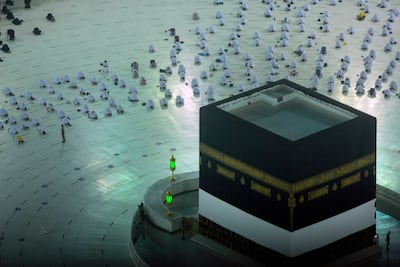Follow the latest updates on Hajj 2021 here
Pilgrims clad in white robes continued to pour into Makkah to perform the first ritual of Hajj early on Sunday, where they were welcomed with white roses and a bag of essentials such as prayer mats and umbrellas to shield them from the sun.
About 60,000 pilgrims will assemble in Mina later on Sunday before they move to mount Arafat the following day.
Pilgrims should spend the day in Mina on Al Tarwiyah, the day of quenching thirst, which is the eighth day of Dhu Al Hijja.
The pilgrimage to Makkah is required once in a lifetime for every Muslim who can afford it and is physically able to go. It used to draw more than two million people.
But for a second straight year it has been curtailed because of the coronavirus, with only vaccinated people in Saudi Arabia able to participate.

One pilgrim described how robots distributed Zamzam water.
“Honestly, it made it easier for us to access water, especially as we have designated paths for circumambulation,” said Faryal from Pakistan.
"I also saw female officers in their uniforms taking charge − an empowering move. I had only seen them on TV. I am excited to see more Saudi female security personnel here.”
Female officers will play a vital role in ensuring that this year’s Hajj is as safe and secure as possible, Fahad Nazer, spokesman for the Saudi embassy in Washington, said in a tweet on Saturday.
Samira Abbas was among thousands of pilgrims who travelled from all over the kingdom to join the allotted groups for this year’s Hajj.
“All the personal suffering, the exhaustion of long hours of travel and hunger just disappeared when I saw the Kaaba. Nothing else matters,” Ms Abbas said.
“Many of us travelled in our ihram, drove for hours and then waited for hours before we could board the bus. It’s been a long journey but this is just the beginning.”
The pilgrims rest after finishing the circumambulation in Makkah and returning to their residential camps in Mina.
Social-distancing measures have been put in place to control the movement of pilgrims. About 500 employees have been positioned at the Grand Mosque in Makkah to organise crowds.
About 20,000 pilgrims performed circumambulation at the Grand Mosque in Makkah on Saturday, the Saudi Press Agency reported.
“It feels different already to Hajj I performed 15 years ago. It used to be more social, but it’s good to ensure safety of others by following social distancing,” said Ayesha, a Pakistani national.
Hajj authorities have been disinfecting the Grand Mosque around the clock to ensure pilgrims' safety.
While many pilgrims have commented on the measures put in place to guard against Covid-19, they also say the pilgrimage remains a deeply personal experience.
Ayman Abdulaljalil, 53, an Egyptian who lives in Makkah, is undertaking the pilgrimage for his late mother.
"My mother passed away a year ago and she really wanted to do Hajj for a second time before she died but she couldn’t, so I decided to do it on her behalf," Mr Abdulaljalil said.
Dina Salem, also an Egyptian resident of Makkah, said she was performing Hajj for her younger sister.
“I’m doing Hajj for my sister who died suddenly. She was only 55 and healthy ... she always wanted to come to Hajj," said Ms Salem, 58.
A person can perform Hajj on behalf of someone who has died or is unable to come to Makkah, but only if they have already performed the pilgrimage for themselves.
Each year, great effort is made to ensure the Hajj goes ahead safely, but the last two years of pandemic adjustments are proving useful to authorities, who have taken advantage of more technological advancements.
"We were allocated groups, given exact Google locations for our camps in case we got lost in the crowd and were escorted by well-trained team leaders to Mina," Ahmed, a Pakistani resident of Saudi Arabia, told The National.
The deputy minister responsible for the event, Abdul Fattah Mashat, said the Hajj and Umrah, a shorter pilgrimage that can be performed at any time of the year, are major components of the Saudi Vision 2030.
The plan aims to boost the religious tourism sector and host 30 million Umrah pilgrims annually by 2030.





